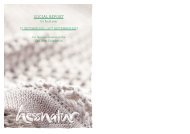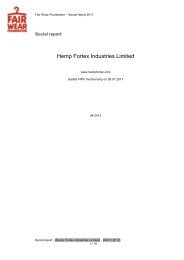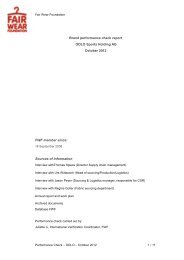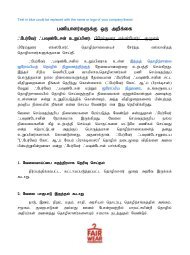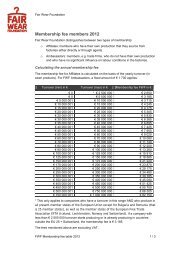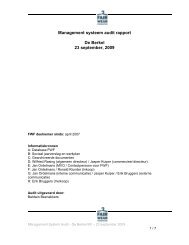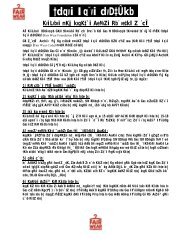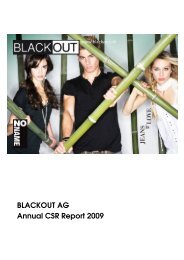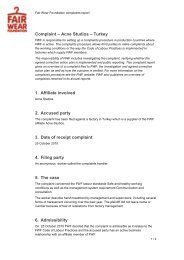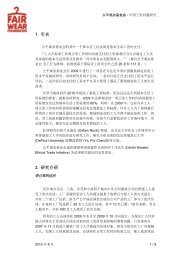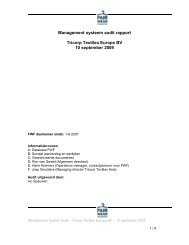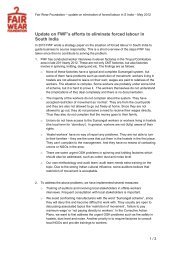here - Fair Wear Foundation
here - Fair Wear Foundation
here - Fair Wear Foundation
Create successful ePaper yourself
Turn your PDF publications into a flip-book with our unique Google optimized e-Paper software.
4. Occasion of complaint procedure being announced<br />
DISK did not refer directly to the formal FWF complaints procedure but has sent the appeal<br />
to different involved parties including FWF, CCC and ITGWLF.<br />
None-the-less it was clear to FWF that this appeal could be treated as a complaint coming<br />
through the formal channels of the complaint procedure.<br />
5. Use of internal procedures<br />
Several representatives from DISK have appealed to the management to get the problem<br />
solved.<br />
6. Admissibility<br />
According to FWF’s complaints procedure, a complaint is admissible if:<br />
1. The foundation of the argumentation of the complaint is solid. Second, the complaint<br />
must fall under the mandate of FWF, meaning that the complaint must concern an<br />
issue which is covered by FWF’s code of labour practice; the way in which the<br />
member company deals with it (such as factory inspections) or the way in which FWF<br />
carries out its activities, such as verification audits or contacts with local partners.<br />
2. If the complaint concerns the relation between employer and employee(s), the CP will<br />
check whether the plaintiff has tried to solve the problem through the company’s<br />
internal complaints procedure.<br />
Disk provided a detailed report 24 April 2006 showing an apparent non-compliance with FWF<br />
labour standard no 4: Freedom of Association and Right to Collective Bargaining.<br />
An internal complaints procedure was not available.<br />
Hence the complaint was found admissible.<br />
7. Metraco’s response to FWF member and FWF.<br />
Although it was requested several times by FWF, Metraco has never reacted by written<br />
statement.<br />
By telephone at first Metraco denied that t<strong>here</strong> was a problem. Later Metraco turned the<br />
argument against DISK making different kinds of allegations against this union.<br />
In later stages however Metraco agreed to have fired employees because of their links with<br />
trade unions and the discussion turned to the exact number.<br />
In a last email (June 4 2007) Metraco again denied all this.<br />
8. Steps taken by FWF<br />
FWF reacted April 5 and contacted its member company JSI/O’Neill. JSI/O’NEILL informed<br />
FWF 18 April that ‘they talked with the Dutch owner (vd Kroft) who will contact the factory<br />
management. JSI/O’Neill will also invite General Manager Mr. Emin Cem Okçu to Holland to<br />
discuss matters within 1 or 1,5 week.”<br />
Mid April FWF asked the FWF local complaint handler in Istanbul to contact the company to<br />
hear their version. The company lawyer denied that they fired workers because of Union<br />
membership. After some more contacts she reported to FWF that she had to give up dealing<br />
with this complaint since the factory simply denied everything.<br />
Metraco denied FWF the possibility to investigate the matter, stating that FWF had been<br />
“introducing DISK-workers during the audit” and was engaged in “actively campaigning”.<br />
Mid-May 2006 FWF visited Istanbul. Metraco refused to meet with FWF.<br />
T<strong>here</strong> were many Dutch buyers involved that were not member of FWF but were member of<br />
one of FWFs founding organisations (the Dutch employers association MODINT). MODINT<br />
coordinated a large part of the activities that took place on behalf of: Scotch&Soda, Pall<br />
Mall/Just Brands, JSI/O’Neill, Gaastra and from Norway the ETI-Norway member Helly<br />
2



